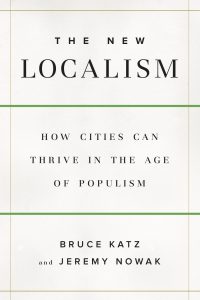How Cities Can Thrive In The Age Of Populism
Responsibility for addressing some of the world’s hardest challenges is being pushed down to cities and metropolitan areas, often without compensating resources or structural authority. As a result, problem solving is increasingly bottom up rather than top down and delivered by networks of institutions and leaders rather than the public sector alone.

Available at Amazon
Buy the book
The New Localism provides a roadmap for change that starts in the communities where most people live and work. In their new book, The New Localism, urban experts Bruce Katz and Jeremy Nowak reveal where the real power to create change lies and how it can be used to address our most serious social, economic, and environmental challenges.
G7 Sustainable Development Ministers’ Meeting, Potsdam Germany · September 13
A G7 Roadmap for Sustainable Urban Development
Thank you for the opportunity to speak at this critical juncture in the modern history of cities and nations.
In many respects, this Meeting of G7 Urban Ministers — the first ever — is the culmination of almost 50 years of research, thought, deliberation and discourse. Since the UN Habitat meeting in Montreal in 1976, networks of nations, cities and stakeholders have been working together to create a strong foundation for global action on sustainable urban development.
Commissioned for The Governance Project · June 25
How States Can Maximize Opportunity Zones
Co-authors: Bruce Katz, Jeremy Nowak, Jamie Rubin, Dan Berkovits
The Tax Cuts and Jobs Act of 2017 provides a new incentive—centered around the deferral of capital gains taxes—to spur private investments in low-income areas designated as Opportunity Zones. Given the significant interest among investors, it is possible that this new tax incentive could attract tens of billions of dollars in private capital, making this one of the largest economic development initiatives in U.S. history.
Bruce Katz & Jeremy Nowak, Commissioned for The Governance Project · March 9
Guiding Principles for Opportunity Zones
The Tax Cuts and Jobs Act of 2017 established an Opportunity Zones tax incentive, which provides a federal capital gains tax deferral and partial exemption for investments in designated Opportunity Zones. Governors in each state will select Opportunity Zones from an eligible group of low-income census tracts. Selections must be made by the third week of March 2018 (or third week of April 2018 if an extension is requested). Given the significant interest among many private investors, it is possible that Opportunity Funds will attract tens of billions of dollars in private capital, making this one of the largest economic development programs in U.S. history.
This policy brief puts forward four principles to guide the selection and development of Opportunity Zones. The principles are designed to enable the greatest job creation potential and the most significant advantages for lower income resident employment, both, inside and outside the eligible zones. Throughout the document we stress the use of data analytics, local knowledge, and the need to see these incentives as just one part of a broader economic development strategy.
Harvard Kennedy School PolicyCast · March 19
The Network Effects that Make Cities Better Problem Solvers
Bruce Katz explains why cities have avoided populism and partisan bickering to become hubs of policy innovation.